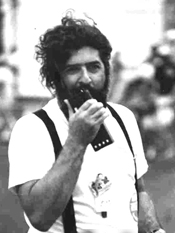 |
→ March 2007 Contents → Column
|
A Letter from New Orleans
A Song for the Kitchen, a Song for the Heart March 2007
|
 |
|
I heard him again, just moments ago.
He's been crisscrossing the neighborhood all morning, his voice deep, strong and melodious: "Mirletons, I got ya mirletons," he sings, with feeling. "Apricots, nice sweet apricots, oh yeah got ya yellow squashes and ya turnip greens an' they some kinda sweet an' good ones today," he intones, the final "daayyyyy" drawn out as a long last note, echoing in diminished returns as it travels down Marigny Street towards Royal.
The dilapidated loudspeaker on his even more decrepit truck crackles and whistles with the changes in the old man's voice. "Here I yam, an' I know ya lookin' fo' me, yes indeed I do. Got them fresh Georgia peaches."
The Vegetable Man is back. His moniker pronounced "Veh-jee table." Seventy-three years of age he proudly announces, driving a smoking Chevrolet pickup truck that was already old when he bought it in 1981, he maneuvers the potholed streets of New Orleans' Faubourg Marigny and Bywater with care. Atop his truck bed, a rusting tin roof is supported by splintered two-by-two-inch boards, which shake side to side rhythmically as he passes through the neighborhoods calling out the lyrics of his edible opera. The metal sheets, salvaged from destroyed sheds in the Ninth Ward, extend out over the back and sides of the truck bed to protect dozens of boxes of pristine, tissue-packaged and beautifully arranged cargo.
An urban 21st-century Mona Lisa, made of fruits and vegetables, framed in scrap metal.

"Got no goddamned soul over there, them goddamned sidewalk cowboys," he says. "Cowboys. Them ain't cowboys. Wearin' boots was made in Taiwan, eatin' store-bought frozen hamburgers while they actin' fo' all the world like they wuz the one what killed the cow. Ain't no goddamned cowboys in Houston."
How I relish the sound of his voice, a curse-filled grumpy, definitely un-PC rumble that my neighbors and I associate with normalcy and backhanded off-color humor.
And we need him. Though there are two mom-and-pop grocery stores now open nearby, our neighborhood supermarket remains in shambles. The nearest large food outlet remains half an hour away by car, if the traffic is right. Many people who live here are elderly or lower-income, or just don't have vehicles. Public transport is a nightmarish joke with, at best, one in 10 bus routes functioning with anything near a regular schedule. So it takes an effort to get good food. Food The Vegetable Man now brings to us.
Though I made a mistake the other day, when he first showed up.

But he reached out and stuck the coins back in my hand, the calluses of his palm scratching my fingers. "What you think," he told me, a smile creeping in under his grimace, "you thinkin' I one a' them titty-bar dancers? I look like I could dance aroun' a pole at my age? Don' need no goddamned tips, boy."
You have got to love The Man.
I ask him if he gets worried riding around with a wad of cash, entirely exposed to the Bad Guys. There are many of them, in spite of the NOPD's efforts, still-flourishing groups of thugs who have taken to frequent muggings and armed robbery in this downtown corridor along the river.
"'Em boys ain't foolin' with no Vegetable Man," he proclaims, tugging mightily at his suspenders and scanning the street end to end with his chin held high, as if daring anyone to contradict his words. "I be layin' some wood on 'em they fool wit' me." He points to the side of his truck bed. A gnarled and chipped baseball bat lies amidst the stacked cantaloupes.
"All I ever needed, all I need now," he says. "Don' wanna kill 'em. Jus' wanna make 'em take pause an' think on they evil ways."
He seems so sure, so confident, that for the moments I stand there, I believe him. I believe in his positive worldview. I believe.
"Gotta make a livin' now," he tells me as he climbs into the dented driver's side door. "Stand here lolly-gaggin' all mornin' wit' you, I ain't gonna make me enough money to cover my gas."
He cranks the engine. Another great cloud of suffocating black and grey fumes explodes from the rear of the truck, rising from beneath the bed. I cough and cover my mouth.
He notices this in his rearview mirror.
"Goddamned public service I'm doin'," he yells. "Killin' skeeters. An' I do it for free."
I hear a gravelly half-chuckle as he puts the truck in gear with his right hand, waves with his left, and ever-so-slowly drives off. It is then that I hear him say something over the roar of the engine and squeaking springs. His pronouncement is faint but unmistakable.
"Boy thinks I'm a goddamned titty-bar dancer."
I never would have thought that hearing that particular combination of words would make me feel so good.
"Got yer ripe tomaters, got yer veh-jee tables..."
© Jim Gabour
Jim Gabour is an award-winning producer and director, whose work focuses primarily on music and the diversity of cultures, such as directing a four-hour worldwide BBC broadcast live via satellites from the carnivals in Rio, Trinidad and New Orleans. Twice named the featured director of the year at the International Broadcasters' Conference in Amsterdam, Gabour produced and directed Norah Jones' multi-platinum DVD concert, and counts subjects as varied as Jamaican hip hop duo Floetry, famed Memphis soul singer Al Green, and recently a concert celebrating the post-Katrina return of traditional Creole jazz families to New Orleans. He is currently finishing a film on composer Terence Blanchard, and serves as Artist-in-Residence and Professor of Music Technology at Loyola University. |
|
Back to March 2007 Contents
|
|